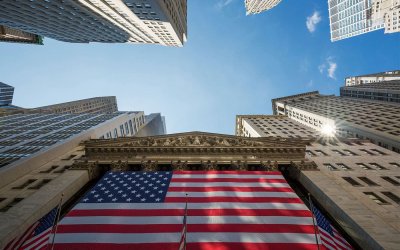The London Stock Exchange (LSE) is the main stock exchange in the United Kingdom, where shares of publically traded companies can be bought and sold.
The exchange has a long history dating back as much as 324 years to 1698 when a broker called John Castaing began posting commodity and share prices in Jonathan’s Coffee Shop.
It wasn’t until 1801 that the first set of regulations was implemented, creating the first modern-day stock exchange to deter trading fraud. In 1973, various regional exchanges were combined to form the Stock Exchange of Great Britain and Ireland, which was later renamed simply the London Stock Exchange.
The exchange’s rich history makes it one of the oldest in the world. Today, it’s owned and managed by the London Stock Exchange Group. And as of 2004, it’s housed at 10 Paternoster Square, City of London.
The LSE has become one of the most diverse exchanges in the world, granting immense levels of capital liquidity for businesses and opportunities for investors. As of November 2022, there are 1,963 stocks listed on the exchange originating from over 60 countries.
While it’s the most popular for equity investors, other exchanges within the United Kingdom serve different purposes. For example, the London Metal Exchange (LME) is the world’s largest future and forward contracts exchange for trading base metals.
How does the London Stock Exchange work?
Like all other exchanges, the LSE acts as a middleman to connect buyers and sellers, facilitating the trading of stocks and shares. The stock markets play a vital role in modern finance, allowing companies to raise money using their equity rather than being forced to take on debt.
The exchange is one of the most inclusive in the world. It’s the leading reason why the LSE provides access to some of the deepest liquid pools of capital.
It’s broken down into two primary segments, each with its own subsegments.
Main Market
The Main Market composes of roughly 40 different sectors. And companies listed on this part of the London Stock Exchange gain access to real-time pricing data, benchmarking through FTSE indices, media coverage, as well as deep liquid capital pools.
There are multiple ways a company can be added to the Main Market:
- Premium – A firm must meet the UK’s super-equivalent rules. These listing requirements are much stricter than the minimums in the European Union. Adhering to higher standards is often more expensive for the business. However, if other criteria are met, it grants access to be included in one of the FTSE indices, like the FTSE 100 or FTSE 250.
- Standard – Available to companies issuing shares, debt securities such as bonds, EU-compliant derivatives, and Global Depositary Receipts. It’s far easier and cheaper for businesses to meet the Standard listing requirements versus Premium. As such, many firms in emerging markets seeking external investments typically list this way.
- High Growth Segment – Used by companies that don’t meet the Premium or Standard listing requirements but are still seeking external funding through equity, typically from institutional investors.
- Specialised Fund Segment – Used by firms that want to issue specialised investment instruments specifically targeting financial institutions as well as professional and highly knowledgeable investors.
Alternative Investment Market (AIM)
The Alternative Investment Market exists to help smaller businesses gain access to capital through public financial markets. The listing requirements are far more relaxed than the Main Market, both in terms of market capitalisation and regulation.
The reduced regulatory and reporting requirements have resulted in higher levels of fraud versus the Main Market. However, no exchange is free from such stories. And for small-cap, micro-cap, and penny stock investors, the AIM has proven to be an excellent hunting ground.
What are the listing requirements for the LSE?
Before a company can be listed on the London Stock Exchange, it must meet the minimum requirement for the segment it’s aiming to be listed in.
| Criteria | Premium | Standard | AIM |
|---|---|---|---|
| Free Float | 10% of total shares must be issued and be in public hands. | 10% of total shares must be issued and be in public hands. | No minimum. |
| Minimum Market Cap | £30m | £30m | No minimum, except for financial & investing companies that must raise at least £6m. |
| Operating History | Must have operated for at least three years. | Must have operated for at least three years | No minimum. |
| Share Price | No minimum closing or offering prices. | No minimum closing or offering prices. | No minimum. |
| Working Capital | Must have sufficient working capital for at least 12 months from the date the prospectus relating to the listing is published. | Must have sufficient working capital for at least 12 months from the date the prospectus relating to the listing is published. | Must have sufficient working capital for at least 12 months from the date the prospectus relating to the listing is published. |
What are the London Stock Exchange’s major indices?
- FTSE 100 – Also known as the Footsie, it’s an index containing the largest 100 companies listed on the London Stock Exchange in market capitalisation. FTSE Russell, a subsidiary of the London Stock Exchange Group, maintains the index.
- FTSE 250 – Like the FTSE 100, it is maintained by the LSE Group’s FTSE Russell. The FTSE 250 is an index of the 101st to 350th largest stock listed on the London Stock Exchange.
- FTSE AIM 100 – An index of the largest 100 companies listed on the Alternative Investment Market.
When is the London Stock Exchange open?
The LSE is open for trading between 8.30 am and 4.30 pm (GMT) Monday through Friday. However, there are some specific dates when the exchange remains closed due to various stock market holidays.
| Holiday | Date | Status |
|---|---|---|
| New Year’s Day | Monday, 2 January 2023 | Closed |
| Good Friday | Friday, 7 April 2023 | Closed |
| Easter | Monday, 10 April 2023 | Closed |
| Bank Holiday | Monday 1 May 2023 | Closed |
| Bank Holiday | Monday, 8 May 2023 | Closed |
| Bank Holiday | Monday, 29 May 2023 | Closed |
| Bank Holiday | Monday, 28 August 2023 | Closed |
| Christmas | Friday, 22 December 2023 | 8:00 am – 12:30 pm |
| Christmas | Monday, 25 December 2023 | Closed |
| Boxing Day | Tuesday, 26 December 2023 | Closed |
| New Year’s Day | Friday, 29 December 2023 | 8:00 am – 12:30 pm |
What are the top companies listed on the London Stock Exchange?
The top 10 companies trading with the largest market capitalisation as of 15 January 2023:
| Rank | Company | Ticker | Market Cap |
|---|---|---|---|
| 1 | AstraZeneca | AZN | £177.42bn |
| 2 | Shell | SHEL | £169.99bn |
| 3 | HSBC Holdings | HSBA | £116.18bn |
| 4 | Unilever | ULVR | £105.84bn |
| 5 | BP | BP. | £87.95bn |
| 6 | Diageo | DGE | £82.58bn |
| 7 | Rio Tinto | RIO | £78.58bn |
| 8 | British American Tobacco | BATS | £70.93bn |
| 9 | Glencore | GLEN | £69.52bn |
| 10 | GSK | GSK | £58.58bn |
The bottom line
The London Stock Exchange is one of the world’s oldest and most liquid stock exchanges and the largest in Europe. It houses thousands of businesses of all sizes and grants businesses across the globe vital access to one of the deepest liquid capital markets available.
Discover market-beating stock ideas today. Join our Premium investing service to get instant access to analyst opinions, in-depth research, our Moonshot Opportunities, and more. Learn More
This article contains general educational information only. It does not take into account the personal financial situation of the reader. Tax treatment is dependent on individual circumstances that may change in the future, and this article does not constitute any form of tax advice. Before committing to any investment decision, an investor must consider their individual financial circumstances and reach out to an independent financial advisor if necessary.





